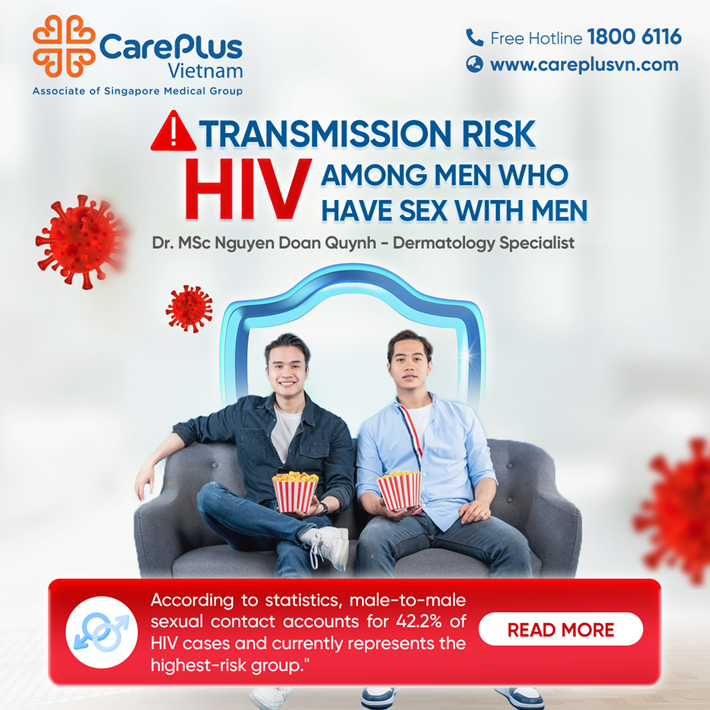INCREASING HIV INFECTION RISK AMONG MEN WHO HAVE SEX WITH MEN IN VIETNAM!

6/4/2025 11:38:05 AM
INCREASING HIV INFECTION RISK AMONG MEN WHO HAVE SEX WITH MEN IN VIETNAM!
Current HIV Infection Statistics (*)
According to UNAIDS data by the end of 2021, there were approximately 38.4 million people living with HIV globally. In 2021 alone, there were 1.5 million new HIV infections and 650,000 AIDS-related deaths worldwide.
In Vietnam, the HIV epidemic is mainly concentrated in the Southeast and Mekong Delta regions, accounting for nearly 80% of newly reported cases nationwide. Ho Chi Minh City alone accounts for more than one-quarter of new cases, with the majority occurring in males (over 80%).
In the past, HIV transmission in Vietnam primarily occurred through blood exposure in people who inject drugs and through sexual contact among female sex workers. In recent years, the rate of HIV transmission via blood has significantly decreased from 47.5% in 2010 to 6.5% as of September 2024. Sexual transmission has become the predominant route, increasing from 47.5% in 2010 to 70.8% in September 2024. Among these cases, men who have sex with men (MSM) account for the highest proportion at 42.2%. MSM is currently considered one of the key high-risk groups for HIV transmission in Vietnam.
(*) Data source: Report from the Vietnam Authority for HIV/AIDS Control (VAAC), as of September 2024.
1. Modes of HIV Transmission
Sexual transmission: HIV can be transmitted through unprotected sexual contact if no preventive measures (such as condoms) are used.
Bloodborne transmission: HIV is spread through blood-to-blood contact in cases such as blood transfusions, sharing needles or syringes, using contaminated medical instruments, razors, tattooing equipment, or direct contact with infected blood via open wounds.
Mother-to-child transmission: If the mother is HIV-positive, the virus can be transmitted to the baby during pregnancy (via placenta), childbirth (via vaginal fluids and blood), or breastfeeding.
2. Why MSM Are at Higher Risk of HIV Infection
Type of sexual activity: Anal intercourse, which is common among MSM, carries a higher risk of HIV transmission due to the anatomy of the rectal mucosa. The anal lining is thinner and not naturally lubricated, making it more prone to microtears through which the virus can easily enter the bloodstream.
HIV can also be transmitted through oral sex, especially if there are open sores or wounds in the mouth or throat.
Lack of protection: Condom use among MSM is often limited due to:
-
Discomfort or preference not to use condoms
-
Perception that pregnancy is not a concern, leading to lower emphasis on condom use compared to heterosexual intercourse
Stigma-related barriers: Societal and familial stigma may prevent MSM from disclosing their sexual orientation or HIV status, limiting their access to HIV prevention and care services.
3. How to Practice Safer Sex for MSM
-
Always use condoms properly during every sexual encounter. Clean the mouth and anus thoroughly after intercourse.
-
Get regular HIV and STI screenings every 3 to 6 months. Know your partner’s health status before engaging in sexual activity.
-
Avoid using stimulants (e.g., drugs, alcohol) before sex, as they may impair judgment and lead to unsafe behaviors.
-
Consider taking PrEP (Pre-Exposure Prophylaxis), a preventive medication that can reduce the risk of HIV infection by up to 98%. However, PrEP does not protect against other STIs such as syphilis, gonorrhea, chlamydia, or genital warts. MSM on PrEP should still practice other safe sex measures.
-
Seek medical attention if you experience unusual symptoms—early detection and treatment can make a significant difference.
If you detect early – treat correctly – live confidently, HIV can become just a small part of your life, rather than something that controls it.
👉 Don’t let fear of stigma stop you from protecting yourself and your loved ones.
👉 Take the initiative to get tested, seek counseling, and start treatment today!
📍 At CarePlus, we offer confidential and comprehensive Sexually Transmitted Infections (STI) Screening Packages for both men and women, with personalized care and consultation from our experienced doctors.
▪️ Learn more about our “STI Screening Package for Men” here:
🔗 https://www.careplusvn.com/vi/tam-soat-cac-benh-lay-truyen-qua-duong-tinh-duc-cho-nam